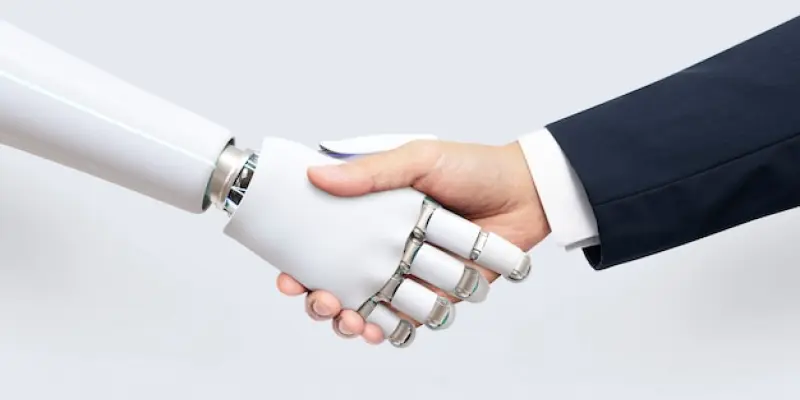Artificial intelligence (AI) is transforming websites by enhancing user experience, improving search functionalities, and automating processes, pushing developers to seek suitable frameworks for optimal AI integration. The decision on which framework to use is pivotal, as it heavily influences the success of integrating AI capabilities into web projects. With the ever-growing digital landscape, websites require increasingly sophisticated and intelligent features to stay competitive. Choosing the right framework ensures that developers can create responsive, scalable, and secure applications that incorporate complex AI models efficiently. This article explores leading frameworks that facilitate seamless AI integration, empowering developers to build intelligent web applications tailored to various project scales and requirements. Understanding the unique strengths and suitability of each framework can aid developers in making informed decisions for their AI-powered website projects.
TensorFlow: Scalability and Extensive Tools
Created by Google, TensorFlow stands out for its extensive range of tools and unparalleled scalability, proving to be a top choice for developing complex AI models. TensorFlow’s robust ecosystem supports a wide array of AI and machine learning tasks, including image recognition, natural language processing (NLP), and recommendation systems. Its ability to scale from individual devices to large distributed systems makes it suitable for projects of all sizes. TensorFlow’s comprehensive library and user-friendly interface allow developers to experiment with different models and quickly iterate on their ideas. This flexibility helps streamline the development process and reduce the time to market.
TensorFlow’s suite of pre-built models and modular architecture makes it a practical choice for developers looking to integrate AI seamlessly within their web applications. The framework’s support for both high-level APIs like Keras and low-level APIs ensures that developers can choose the appropriate level of abstraction based on their expertise and project needs. Additionally, TensorFlow’s compatibility with various platforms – from cloud-based solutions to mobile devices – enhances its versatility. The extensive documentation and active community support further simplify the learning curve, enabling developers to tackle complex tasks confidently.
PyTorch: Dynamic and Flexible
PyTorch, developed by Facebook, is another leading framework known for its dynamic computational graph and intuitive interface, making it ideal for deep learning tasks. One of the major advantages of PyTorch is its flexibility, which allows developers to implement frequent updates and custom changes to their models with ease. This quality is particularly beneficial in AI-driven applications that require constant refinement and adaptation to new data. PyTorch’s dynamic nature enables developers to work with real-time data and tweak models on the fly, which is crucial for applications like chatbots and predictive analytics.
The framework’s ease of use makes it accessible to both new and experienced developers, fostering a collaborative environment for AI development. PyTorch’s strong support for GPU acceleration ensures that models can be trained and deployed quickly, meeting the demands of modern web applications. Furthermore, its compatibility with various libraries and tools enhances its usability and integration capabilities. By choosing PyTorch, developers can leverage its powerful features to create and deploy AI models efficiently, providing robust solutions for enhancing user interactions and insights.
Django: Rapid Development and Security
Django is a high-level web framework known for its rapid development capabilities, security, and efficient handling of vast amounts of data. One of Django’s key strengths lies in its architecture, which supports quick and straightforward integration of AI functionalities such as sentiment analysis and user behavior tracking. Its built-in features, including an authentication system and admin interface, enable developers to build secure applications rapidly. Moreover, Django’s seamless compatibility with machine learning libraries like TensorFlow and PyTorch facilitates advanced AI-driven user experiences.
The framework’s robust data management tools ensure efficient handling and processing of large datasets, which are essential for training and deploying AI models. This makes Django a suitable choice for projects that demand extensive data handling and high security standards. Additionally, Django’s modular design allows developers to add or remove components as needed, providing flexibility in project development. Its extensive documentation and supportive community further enhance its appeal, making it a reliable framework for integrating AI into web applications.
Flask: Flexibility for Small-Scale Projects
Flask, a lighter and more flexible web framework, is particularly suitable for small-scale projects and prototyping AI integrations. Despite its minimalist design, Flask can effectively incorporate AI models to deliver personalized user experiences and real-time analytics. Its simplicity and ease of use make it perfect for developers looking to quickly prototype and test AI functionalities before scaling up. Flask provides the freedom to choose specific components and libraries tailored to the project’s needs, allowing for greater customization and control over the development process.
The framework’s versatility extends to its ability to integrate various machine learning models, facilitating the creation of intelligent applications without the complexity of larger frameworks. Flask’s lightweight nature ensures that developers can build efficient and responsive web applications, making it ideal for startups and small teams. By leveraging Flask, developers can focus on the core AI features of their applications, testing and iterating quickly to achieve optimal results. This approach not only accelerates the development process but also allows for more innovative and user-centric solutions.
Conclusion
In conclusion, choosing the right framework for building AI-powered websites is essential for developers to create applications that are responsive, scalable, and secure. TensorFlow, with its scalability and extensive tools, is ideal for large-scale projects. PyTorch offers dynamic and flexible solutions, especially suitable for deep learning tasks. Django provides rapid development and security, making it perfect for projects that require extensive data handling. Flask offers flexibility and simplicity, making it perfect for small-scale projects and prototyping. Understanding the unique strengths and suitability of each framework helps developers make informed decisions tailored to their project requirements, ultimately enhancing user interactions and ensuring the success of their AI-powered websites.

